We may not have the course you’re looking for. If you enquire or give us a call on +800 312616 and speak to our training experts, we may still be able to help with your training requirements.
We ensure quality, budget-alignment, and timely delivery by our expert instructors.
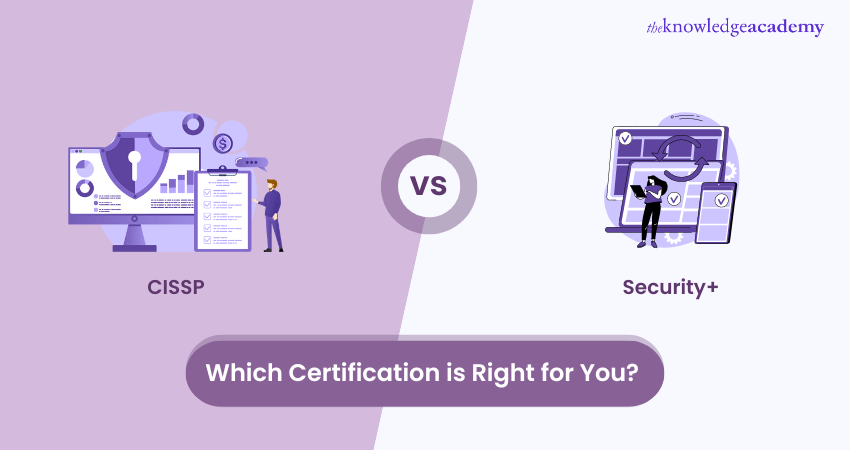
CISSP and CompTIA Security+ are both notable cybersecurity certifications respected and recognised worldwide. While choosing the top-most certifications, CISSP and CompTIA Security+ stand out in the security industry for their applicable and reliable standards.
CompTIA Security+ was first launched in 2002 to meet the demand for qualified IT/IS professionals. CISSP was established in 1994, to provide in-depth knowledge and understanding to cybersecurity professionals. Recently we have witnessed a surge in the number of applicants for the CISSP exam.
Further reference, such as the CompTIA Security+ Study Guide, will aid you in gaining insights before choosing CISSP or CompTIA Security+ certifications.
Table of Contents
1) What is CISSP Certification?
2) What is CompTIA Security+?
3) Differences Between CISSP and CompTIA Security+
4) CISSP vs Security+ Exam Details
5) CISSP vs Security+ Salary
6) CISSP and CompTIA Security+ Job Opportunities
7) Conclusion
What is CISSP Certification?
The Certified Information Systems Security Professional (CISSP) exam is one of the most respected certifications for cybersecurity professionals in the UK. It is intended for experienced cybersecurity experts and demonstrates their knowledge across a wide range of security domains.
The CISSP is also recognised by the UK Ministry of Defence and meets the baseline requirements for Information Assurance (IA) roles in System Architecture and Engineering (IASAE) levels I and II. Known for its difficulty, the exam is best suited for highly experienced professionals in cybersecurity and ranks among the top five highest-paying careers, with an average salary of about £125,000. The exam fee is £590, and certification must be renewed every three years by earning 120 Continuing Professional Education (CPE) credits.
CISSP covers eight key domains, including risk management, security operations, cryptography, architecture/design, access control, security testing, authentication, engineering, and network security. To qualify, candidates must have at least five years of full-time experience in at least two of these domains, according to the ICS2 Common Body of Knowledge (CBK).
Below is the list of eight CISSP Domains discussed.
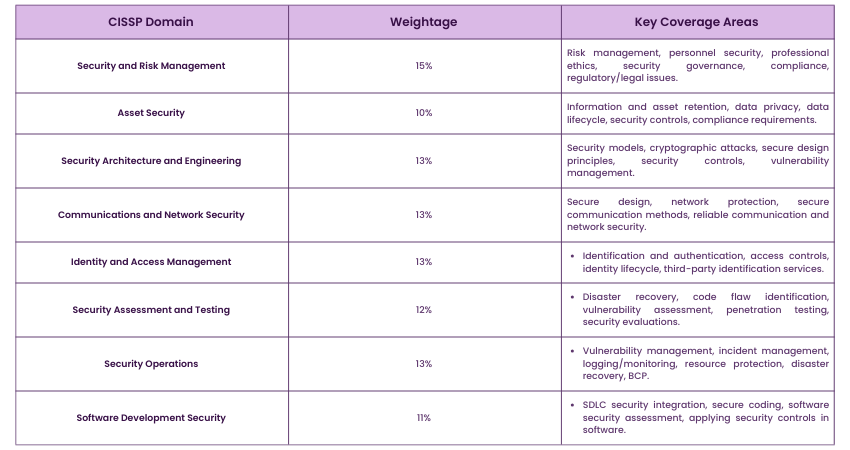
What is CompTIA Security+?
CompTIA Security+ is a certification that validates knowledge and skill level, mainly focusing on risk management and network protection. The exam tests knowledge of core security concepts, including controls, weaknesses, and threats.
Security+ is a vendor-neutral certification—in other words, it is applicable to any platform or technology. This makes Security+ an excellent choice for anyone who wishes to work towards further IT certifications and careers in cybersecurity roles. It is an extremely sought-after certification, particularly in the realm of cybersecurity within military and government jobs.
The Security+ certification requires passing a CompTIA exam, which is performance-based and assessed using multiple questions that test security principles. Although it is recommended for candidates to have two or more years of work experience in IT before taking the exam, there are no prerequisites related to previous working experiences.
Earning the Security+ certification is a good way to set yourself apart in the busy sector that is cybersecurity.
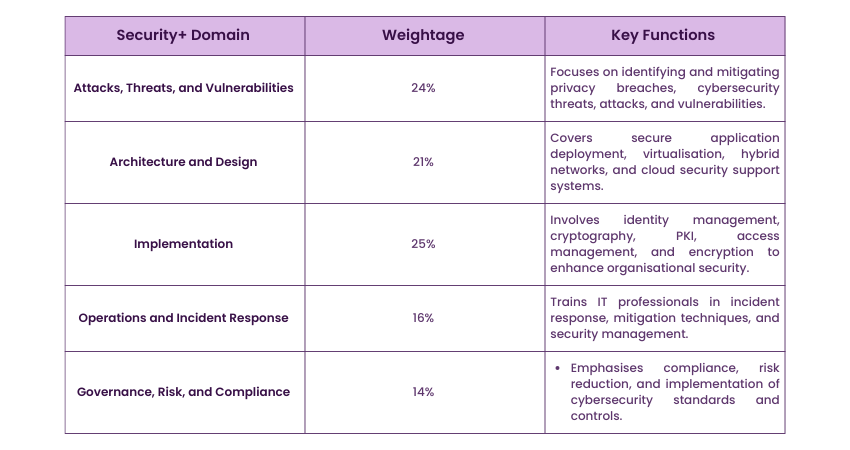
Join CompTIA Security+ Certification Now, To Advance into More Senior Roles in IT Industry.
Differences Between CISSP and CompTIA Security+
The main distinctions between CISSP and CompTIA Security+ are shown here.
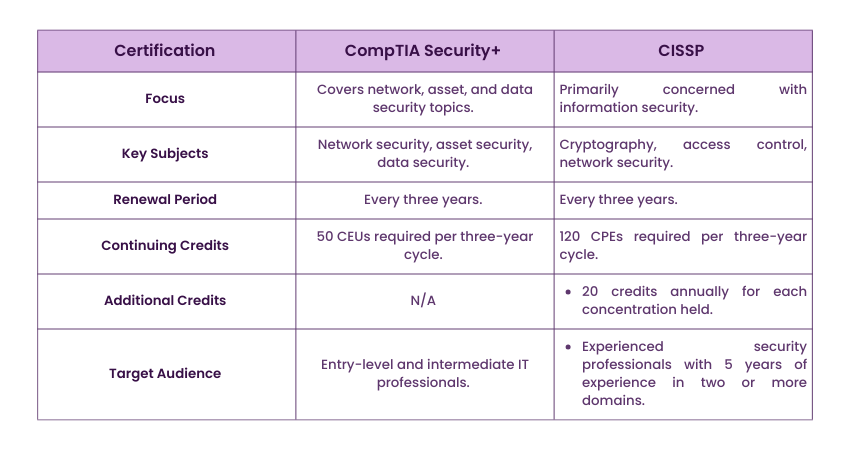
Focus
The CompTIA Security+ certification covers a broad swath of cybersecurity topics, including network security, asset security, data protection, and numerous other fundamental areas needed to secure digital environments. It should be more of a big-picture overview covering some basic principles every network admin needs to know about managing and securing networks.
Conversely, CISSP stands for Certified Information Systems Security Professional and mainly relates to more senior concepts in IT security. It covers the more technical areas, like cryptography, access control, and network security from a broader perspective of information security with eight domains that address most all aspects one could imagine.
Key Subjects
CompTIA Security+ focuses on network security networking, access control, asset management, and data protection. It is an entry-level certification, which means candidates should have knowledge of how to secure an IT environment.
On the other side, CISSP covers some of the most advanced topics related to security, such as cryptography, access control, and network security. As an example, the CISSP (Certified Information Systems Security Professional) exam is meant to heavily test one's ability in designing, implementing, and managing a resilient cybersecurity program across a broad spectrum of domains.
Renewal Period
Either certification must be renewed every three years, verifying the ability of professionals to maintain their competence and sustain industry standards and best practices. Both CompTIA Security+ (a 3-year renewal cycle) and CISSP follow a three-year re-certification policy, as the cybersecurity industry is ever-changing with new threats and opportunities emerging regularly.
Continuing Credits
CompTIA Security+ certification requires holders to earn 50 Continuing Education Units (CEUs) over each three-year cycle to keep their certification valid. This emphasises the value of continuous learning and staying up to date with new cybersecurity trends and technologies.
On the other hand, the CISSP certification has a more demanding requirement, necessitating the accumulation of 120 Continuing Professional Education (CPE) credits every three years. This reflects the advanced nature of the certification and the expectation that CISSP professionals will continuously engage in learning to maintain their expertise.
Additional Credits
There are no additional credit requirements beyond the 50 CEUs needed for CompTIA Security+ renewal.
But in the case of CISSP, professionals should earn 20 CPE credits annually for each concentration they possess, if any. This additional requirement ensures that professionals maintain their expertise in a specific area of information security.
Target Audience
The CompTIA Security+ Certification is ideal for entry-level and intermediate IT professionals seeking to start or advance their careers in cybersecurity. It establishes a strong foundation and is beginner friendly.
Conversely, the CISSP certification is intended for more seasoned security professionals. It requires at least five years of full-time paid work experience across a minimum of two domains within the past ten years. This makes it suitable for those willing to advance their knowledge and skills in information security management.
The Security+ test and the CISSP exam are both crucial for a career in cybersecurity, but they each concentrate on different facets of the industry.
These are only a few main distinctions between CISSP and CompTIA Security+. The ideal option will depend on your experience and professional objectives, even though both certificates are beneficial for IT professionals who wish to expand their computer and antivirus skills.
Irrespective of New or Working IT Professionals, You Can Join CompTIA Training to Boost Your Performance.
CISSP vs Security+ Exam Details
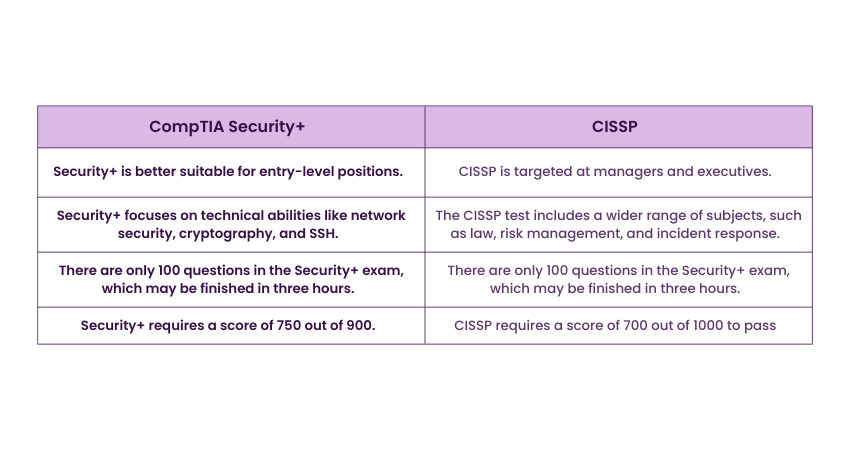
As you can see, these two tests have certain parallels as well as some variances. However, for people looking to begin a career in IT security, both tests are helpful.
To Receive CISSP-ISSAP Certification, Join ISSAP Training & Certification Course Now.
CISSP vs Security+ Salary
CISSP is more challenging to pass than the Security+ exam. Employers more frequently accept the CISSP certification. Seventy per cent of businesses stated they would prefer to hire a candidate with a CISSP certification, according to a recent survey.
According to a report generated from PayScale, below is the average salary for both CompTIA Security+ and CISSP Jobs
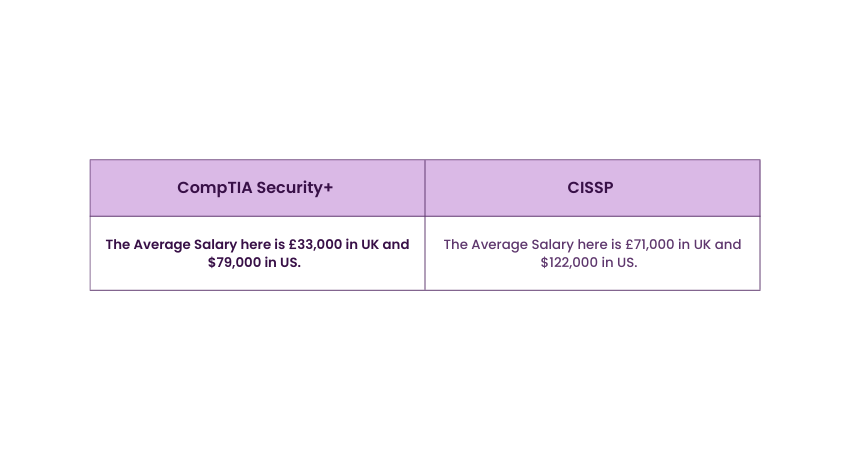
Below is the average salary for CompTIA Security+ compared based on PayScale Surveys
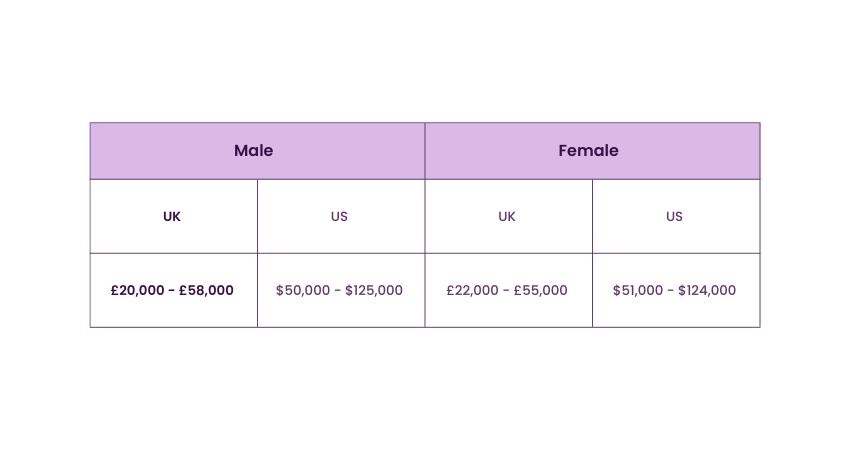
CompTIA Security+ Salary Based on Gender
Below is the average salary for CompTIA Security+ compared based on PayScale Surveys

CISSP Salary Based on Gender
Below is the average salary for CISSP compared based on PayScale Surveys.
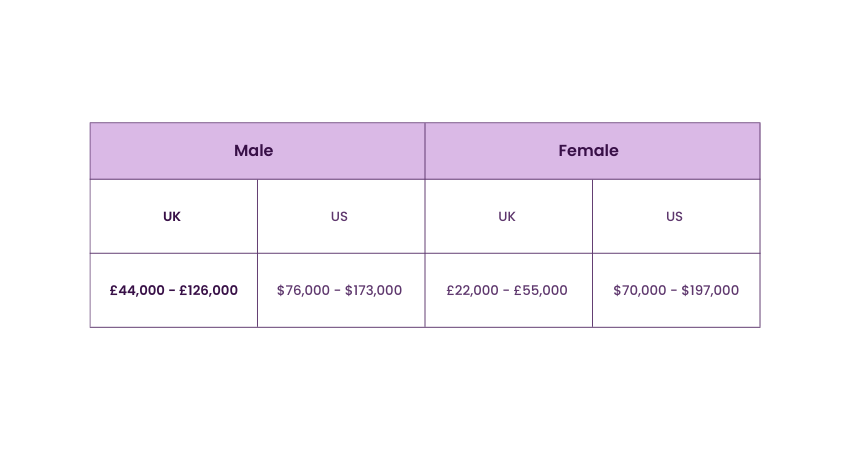
CISSP and CompTIA Security+ Job Opportunities
Following is the list of CompTIA Security+ related Job roles
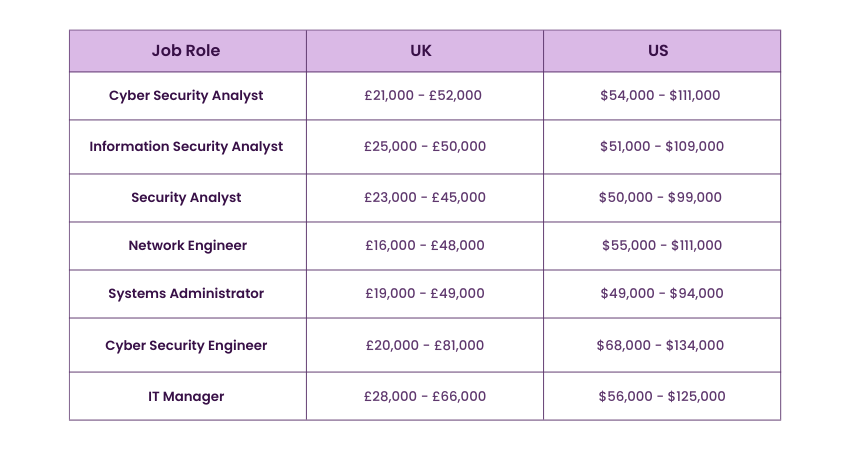
Below are a few CISSP-related job roles and opportunities mentioned to understand the prospective careers you can choose after obtaining a CISSP certification.
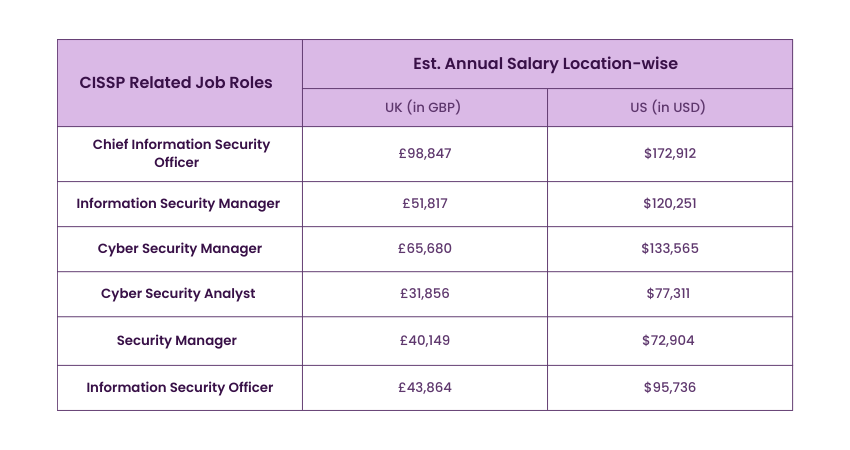
Get ready for your CISSP interview with our expert guide on CISSP Interview Questions. Start today!
Conclusion
Even though both examinations are crucial for a future in cybersecurity, people tend to value the CISSP exam more concerning job prospects. In the CISSP vs Security+ blog, you can analyse based on the numerous factors discussed above and pick the suitable certification based on your qualifications, eligibility, budget, and the direction of career advancement.
To Receive CISSP-ISSAP Certification, Join ISSAP Training & Certification Course Now.
Frequently Asked Questions
What are the Benefits of CompTIA Security+ Certification?

CompTIA Security+ provides foundational knowledge in cybersecurity, enhancing job prospects for entry-level IT roles. It validates essential skills in network and data security, boosts career advancement opportunities, and is globally recognised, making it a valuable certification for aspiring professionals.
Does CISSP Require Coding?

CISSP does not require coding skills, but having a basic understanding can be beneficial. The exam focuses on security management, risk assessment, and design principles rather than hands-on coding, making it more about strategic planning and implementation in cybersecurity.
What are the Other Resources and Offers Provided by The Knowledge Academy?

The Knowledge Academy takes global learning to new heights, offering over 3,000 online courses across 490+ locations in 190+ countries. This expansive reach ensures accessibility and convenience for learners worldwide.
Alongside our diverse Online Course Catalogue, encompassing 19 major categories, we go the extra mile by providing a plethora of free educational Online Resources like News updates, Blogs, videos, webinars, and interview questions. Tailoring learning experiences further, professionals can maximise value with customisable Course Bundles of TKA.
What is Knowledge Pass, and How Does it Work?

The Knowledge Academy’s Knowledge Pass, a prepaid voucher, adds another layer of flexibility, allowing course bookings over a 12-month period. Join us on a journey where education knows no bounds.
What are the Related CISSP Trainings and Blogs Provided by The Knowledge Academy?

The Knowledge Academy offers various CISSP Training, including CISSP-ISSAP Training & Certification, CISSP Certification, Chief Information Security Officer Training and Information Systems Security Management Training. These courses cater to different skill levels, providing comprehensive insights into CISSP Case Study.
Our IT Security & Data Protection Blogs cover a range of topics related to CISSP Certification, offering valuable resources, best practices, and industry insights. Whether you are a beginner or looking to advance your IT Security skills, The Knowledge Academy's diverse courses and informative blogs have got you covered.
Upcoming IT Security & Data Protection Resources Batches & Dates
Date
 CISSP Certification
CISSP Certification
Mon 10th Mar 2025
Sat 22nd Mar 2025, Sun 23rd Mar 2025
Mon 7th Apr 2025
Sat 19th Apr 2025, Sun 20th Apr 2025
Mon 12th May 2025
Sat 17th May 2025, Sun 18th May 2025
Mon 9th Jun 2025
Sat 21st Jun 2025, Sun 22nd Jun 2025
Mon 14th Jul 2025
Sat 19th Jul 2025, Sun 20th Jul 2025
Mon 11th Aug 2025
Sat 23rd Aug 2025, Sun 24th Aug 2025
Mon 8th Sep 2025
Sat 20th Sep 2025, Sun 21st Sep 2025
Mon 13th Oct 2025
Sat 18th Oct 2025, Sun 19th Oct 2025
Mon 10th Nov 2025
Sat 22nd Nov 2025, Sun 23rd Nov 2025
Mon 8th Dec 2025
Sat 20th Dec 2025, Sun 21st Dec 2025






 Top Rated Course
Top Rated Course



 If you wish to make any changes to your course, please
If you wish to make any changes to your course, please


